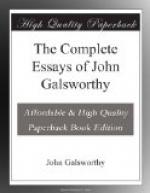Dipping down now over the road, we passed hounds going home. Pied, dumb-footed shapes, padding along in that soft-eyed, remote world of theirs, with a tall riding splash of red in front, and a tall splash of riding red behind. Then through a gate we came on to the moor, amongst whitened furze. The mist thickened. A curlew was whistling on its invisible way, far up; and that wistful, wild calling seemed the very voice of the day. Keeping in view the glint of the road, we galloped; rejoicing, both of us, to be free of the jog jog of the lanes.
And first the voice of the curlew died; then the glint of the road vanished; and we were quite alone. Even the furze was gone; no shape of anything left, only the black, peaty ground, and the thickening mist. We might as well have been that lonely bird crossing up there in the blind white nothingness, like a human spirit wandering on the undiscovered moor of its own future.
The mare jumped a pile of stones, which appeared, as it were, after we had passed over; and it came into my mind that, if we happened to strike one of the old quarry pits, we should infallibly be killed. Somehow, there was pleasure in this thought, that we might, or might not, strike that old quarry pit. The blood in us being hot, we had pure joy in charging its white, impalpable solidity, which made way, and at once closed in behind us. There was great fun in this yard-by-yard discovery that we were not yet dead, this flying, shelterless challenge to whatever might lie out there, five yards in front. We felt supremely above the wish to know that our necks were safe; we were happy, panting in the vapour that beat against our faces from the sheer speed of our galloping. Suddenly the ground grew lumpy and made up-hill. The mare slackened pace; we stopped. Before us, behind, to right and left, white vapour. No sky, no distance, barely the earth. No wind in our faces, no wind anywhere. At first we just got our breath, thought nothing, talked a little. Then came a chillness, a faint clutching over the heart. The mare snuffled; we turned and made down-hill. And still the mist thickened, and seemed to darken ever so little; we went slowly, suddenly doubtful of all that was in front. There came into our minds visions, so distant in that darkening vapour, of a warm stall and manger of oats; of tea and a log fire. The mist seemed to have fingers now, long, dark white, crawling fingers; it seemed, too, to have in its sheer silence a sort of muttered menace, a shuddery lurkingness, as if from out of it that spirit of the unknown, which in hot blood we had just now so gleefully mocked, were creeping up at us, intent on its vengeance. Since the ground no longer sloped, we could not go down-hill; there were no means left of telling in what direction we were moving, and we stopped to listen. There was no sound, not one tiny noise of water, wind in trees, or man; not even of birds or the moor ponies.




